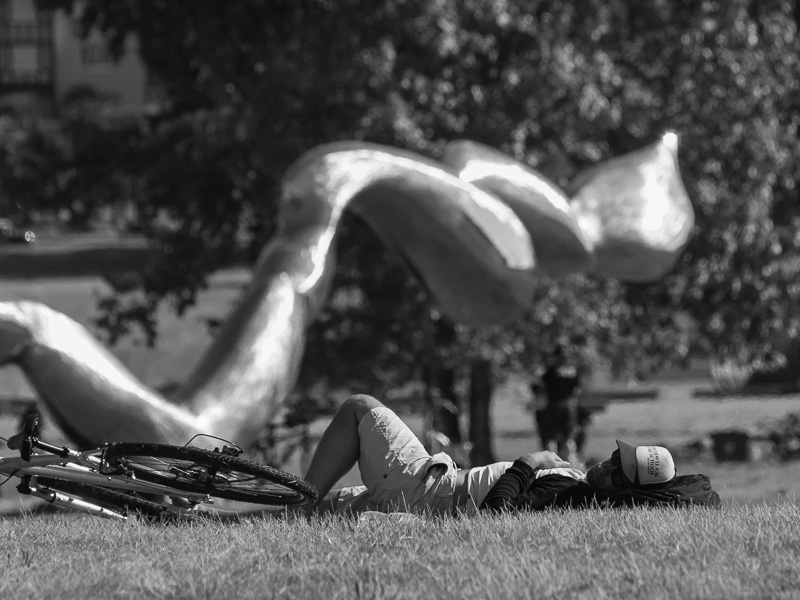
After a month of driving to from in and around western Canada, I’m wondering what to do next. While on the road, I did as I intended, writing poems as I went. Maybe not as many poems as I would have liked, but enough that I have the raw material for a chapbook. Maybe that’s what I’ll do next. I’ll sift through my nearly 6,000 photos and blend them with my words. But what should I use for a theme? What organizing principle? I don’t want to collate a bunch of unrelated poems and throw them at the reader with another bunch of pretty pictures. Themes like “travel as metaphor for life’s journey” or a “celebration of a romantic wanderlust” are too obvious and hackneyed. I don’t want to impose something on my month’s output. Something will emerge if I sit patiently with it for a while.
I’m thinking this aloud as I open the stack of mail waiting for me on the kitchen table. I tear open an oversized envelope and find the 4th issue of Poetry Is Dead, a Vancouver-based poetry journal, an anomaly in today’s precarious world of letters—a startup poetry journal that deals in the physical world instead of delivering itself through Ethernet cables and wireless networks.
I read the letter from the editor and discover that Issue #4 has a theme. (If it has a theme, then I should have a theme too.) The editor (Daniel Zomparelli) opens with “Vancouver is a strange place”. Coincidentally, Vancouver is one of the places we visited. We weren’t there long. We crashed on the living room floor at my wife’s cousin’s place for a couple nights. He played the perfect host, giving us tourists a flavour of the city, taking us through Hastings and Main to see all the junkies and prostitutes, taking us for breakfast at Sophie’s Cosmic Café near Kitsilano Beach. There was a walk on the beach and on into Stanley Park, shopping on Robson Street, topped off by a visit to the Olympic torch that famously failed, then a drive home through Gastown.
A quick survey of my poems shows a jump from Kaslo to Victoria. Not a single mention of Vancouver in between. The gap, I think, has to do with Zomparelli’s observation: Vancouver is indeed a strange place. It’s not that I had no impression of Vancouver. And I’ve been there before so I have an impression of it over time. It’s more that I’m overwhelmed by it. The place seems irreducible to poetry.
Part of what makes Vancouver a strange place (according to Zomparelli) is that no one actually comes from Vancouver. What is true of ordinary citizens is doubly true of poets. And so it becomes problematic to speak of “Vancouver poets” or of a “Vancouver poetics” since these don’t have anything to do with being born in a place. Zomparelli resolves this by speaking of “influence” and this becomes the theme for Issue #4.
I’m not exactly sure what he means by influence. Is he talking about the influence that poets writing and speaking in Vancouver have on one another and the world beyond the city limits? Call it political influence if you like. Or is he talking about the influence of place? Call it geographic influence. I don’t think the poet exists who isn’t influenced by place and the particular details of local geography. It infects the imagination and oozes onto the page. Or maybe it’s influence in the other direction—kind of a dialogue with the place—where the poet responds to the place they inhabit and it listens and speaks in turn.
Throwing Issue #4 in dialogue with Vancouver and with all the other places I passed through during the month of September, it dislodges the sliver of a theme. I think of belonging. What does it mean to belong? Do we belong to a place? What happens inside us that makes us feel sufficiently at ease that we can say: I belong here? Where is here? In this place? In this body? In this relationship? In this legal status? In this coffin?
Place is like body. We who are schooled on a diet Western thought tend to treat both place and body as accidental features to an essential thinking consciousness. Our identity is nowhere. It is a numinous product of our rootless minds. Place is irrelevant to matters of identity. Labour is infinitely mobile. The ground is plastic and can be reformed to any shape we please. Our plants don’t need soil anymore. If Google had its way, we’d deposit our lives in server farms and live as electronic pulses.
Being Canadian affects how I think about belonging. In a former colony federalist state of mostly immigrant citizens, belonging requires constant negotiation. I belong in Canada, but on a boat ride on Mud Lake in central British Columbia, I felt as foreign as the Dutch and German tourists we shared our boat with. The Dutch couple seemed surprised to learn that our home is 4,500 km away. Even so, in their eyes, we still “belong” here. But in our eyes, belonging as citizenship is an abstraction that is meaningless without the continual interplay of the local.
This is a sampling of the concerns I hope to tease out as I pass my road trip poems through the thematic filter of belonging. I hope to have some kind of artsy-looking chapbook with glossy photos ready in the new year. Maybe I’ll charge money for it. And then, when you pay me money, it will belong to you.